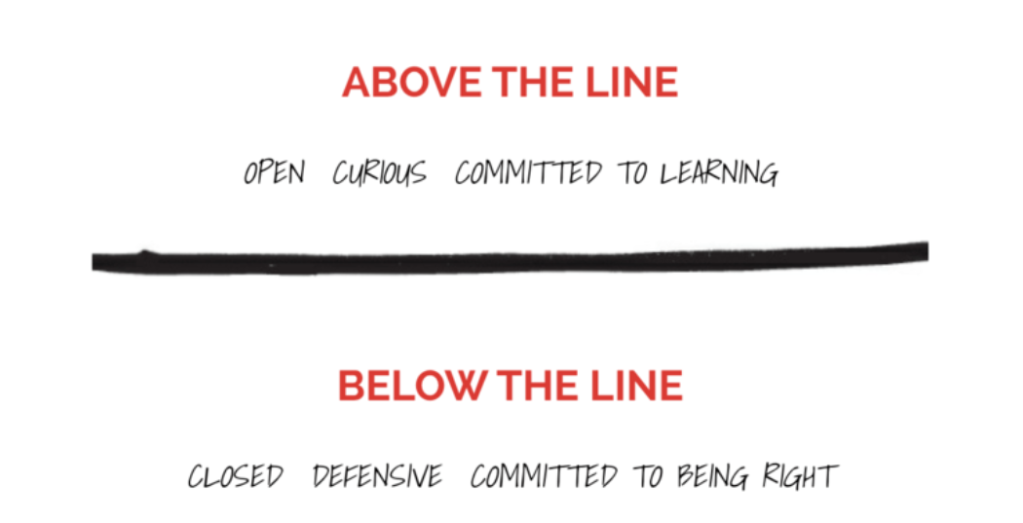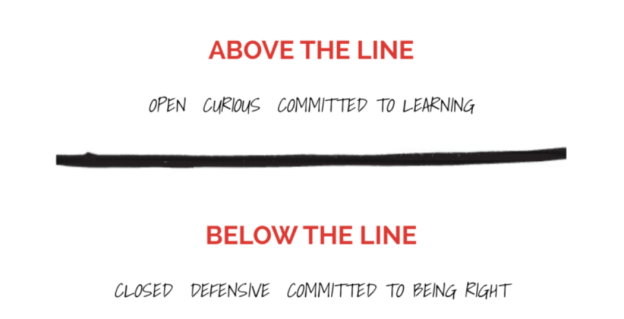My co-worker Jeff has said this in jest over the years, but I realized recently that he was trying to tell me that I have a problem: A problem with wanting to be right. Our egos get in the way, afraid that we will be seen as failures if we are wrong. We fight for it. We defend our position. I admit, this has been me before.
Now I’m on the road to recovery—realizing that trying to be right prevents our learning. I first heard about his concept listening to a Tim Ferris Podcast. I then read the book, The 15 Habits of Conscious Leadership and the lightbulb went on.
We live in a complicated world with complicated jargon. People try to explain concepts and we get lost but are afraid to admit it so we nod our heads as if we understand only to leave confused and afraid to seek clarification.
But sometimes it’s the simple things that resonate, like one simple horizontal line and a reference to either being above it or below it. Not complicated and no confusion. Below are excerpts from the book.
Leading from above the line At any point, a leader is either above the line or below the line. If you are above it, you are leading consciously, and if you are below it, you are not. Above the line, one is open, curious, and committed to learning. Below the line, one is closed, defensive, and committed to being right.

Many people lead from below the line – it’s a common state stemming from millions of years of evolution. As soon we we sense the first whiff of conflict our lizard brain kicks in. Fear and Anger rise up, we get defensive and double down on being right. At this point we’re firmly below the line.
Knowing that you’re below the line is more important than being below the line. The first mark of conscious leadership is self-awareness and the search for truth. The second is pausing, taking a second, and shifting yourself into a open and curious state, and rising above the line.
The first of the 15 habits really resonated with me as well. The habit of taking what the authors call Radical Responsibility:
I commit to taking full responsibility for the circumstances of my life and for my physical, emotional, mental, and spiritual well-being. I commit to supporting others to take full responsibility for their lives.
Taking full responsibility for one’s circumstances (physically, emotionally, mentally, and spiritually) is the foundation of true personal and relational transformation. Blame, shame, and guilt all come from toxic fear. Toxic fear drives the victim-villain-hero triangle, which keeps leaders and teams below the line.
Conscious leaders and teams take full responsibility—radical responsibility—instead of placing blame. Radical responsibility means locating the cause and control of our lives in ourselves, not in external events.
Instead of asking “Who’s to blame?”, conscious leaders ask, “What can we learn and how can we grow from this?” Conscious leaders are open to the possibility that instead of controlling and changing the world, perhaps the world is just right the way it is. This creates huge growth opportunities on a personal and organization level.
Why is this hard?
As mentioned earlier, our egos drive us to want to be right. The shift required can be significant. We now have to be open to the possibility that the other person, or other situation may at least be partially right and this curiosity needs to force us above the line to be open to learning. How many times in your life have you been convinced that you are right, that this other person or place is wrong for you without even giving that person or place a chance. Challenge yourself to see it another way.
The benefits can be life changing. With this re-framing, you’re in a much better place personally and professionally. But it takes practice and patience. Rarely do any of us get it perfect all the time. I’ve found a good place to just start is simply recognizing when you’re below the line—it must start with that. The shift to above the line takes practice but taking radical responsibility for it is a game changer.
So, what’s preventing you?
